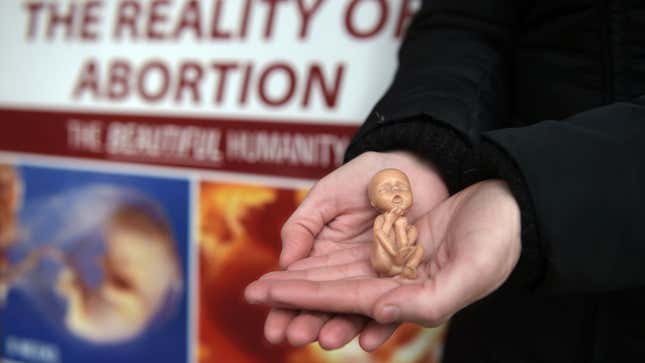The Anti Abortion 'Replacement' for Planned Parenthood Isn't Doing Much—Except Gobbling Taxpayer Money
Politics

Earlier this year the California-based network of Obria clinics wrestled a potential $5 million grant from the federal government. The group had positioned itself as the “pro-life” Planned Parenthood, an organization that could divert health grants into something that offered virginity instead of The Pill; the kind of place destined to draw attention from federal agencies sympathetic to a rigid anti-abortion agenda.
Eight months later, it’s unclear exactly how those funds are being used, and reports portray the Obria health centers as deeply unprepared to provide the services initially promised. A Mother Jones investigation suggests Obria’s offices (and mobile vans) are barely seeing patients and inflating clinical partnerships; the story also raises questions about how taxpayer money is actually being spent. Obria’s “telehealth” app, once shopped out to investors and donors, has yet to be fully developed. Abby Johnson, among the most sought-after motivational speakers in the anti-contraceptive movement after walking out of Planned Parenthood a decade ago, was at one point a high-profile Obria employee. Recently, she accused the organization of lying to the people who gave it money and orchestrating federal grants as a “cash grab” to pay executive salaries. (That Johnson herself orchestrated something of a long-term cash grab when she fudged the circumstances of her exit from Planned Parenthood and built a small media empire on her story should not, however, go unrecognized.)
Together, these stories portray an organization almost comically unprepared to navigate the scrutiny of a federal grant program, a joke that would certainly be funnier if it hadn’t coincided with the draining of funding from clinics with decades of experience in both filing paperwork and providing care. The dissonance between Obria’s early marketing materials and the reality of its “expansion” probably have something to do with the anti-abortion network’s lack of experience in both of those matters, despite large infusions of taxpayer money to help them figure it out.
And this is a funding stream, by the way, they seemed to have stumbled upon almost completely by accident: As emails obtained by the Campaign for Accountability suggest, the group only first learned of the Title X grant program from an article in Breitbart News, about a year before they were granted almost $2 million.
-

-

-

-

-

-

-

-

-

-

-

-

-

-

-

-

-

-

-

-

-

-

-

-

-

-

-

-

-

-

-

-

-

-

-

-

-

-

-

-








































